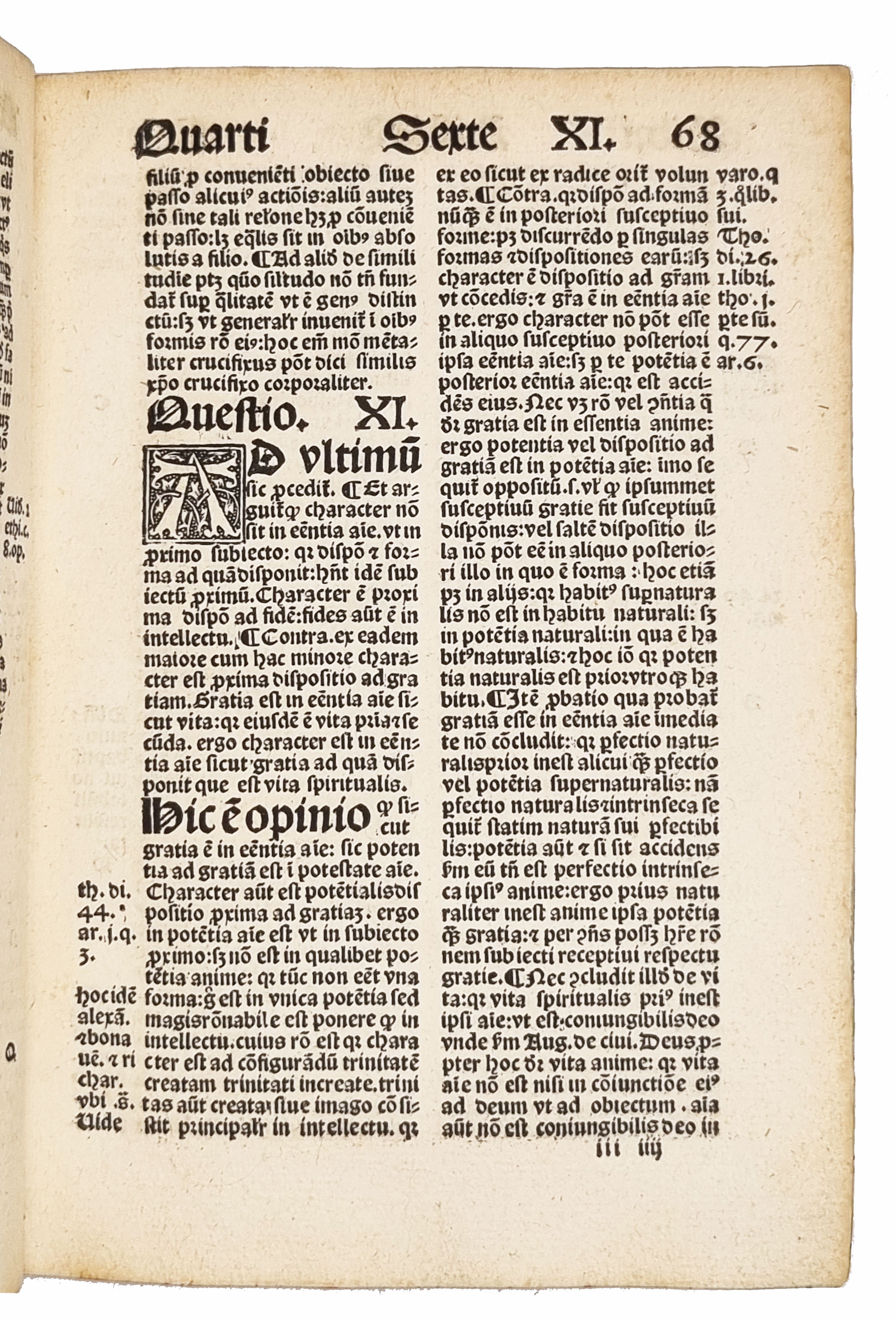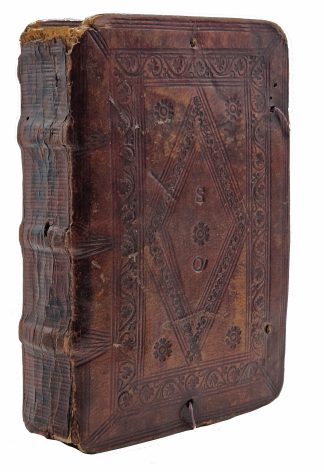DUNS SCOTO, Joannes; FANTIS, Antonio de, ed.
ATTRACTIVE CONTEMPORARY BINDING
Super quarto Sententiarum.
Lyon, Jacques Myt for Jacques and François Giunta, 1520.£3,750.00
8vo. ff. 377, [5]. Gothic letter, double column. Title in red, within woodcut border of putti and grotesques, portrait of author in his study, woodcut putti holding printer’s device at foot, decorated initials. Tear with loss of early ms inscription at blank foot of title, light browning, slight marginal foxing in places. A very good copy in contemporary reddish-brown goatskin, remains of ties, triple blind ruled, outer border with blind roll of leaves and tendrils in blind, central panel with single blind ruled lozenge bordered with blind roll of leaves and tendrils, blind-stamped fleurons to outer corners, another to centre blind-stamped SQ, raised bands, compartments single blind ruled horizontally, early ms title to spine, small loss at head and foot, corners a bit worn, spine lining from c.1300 rubricated vellum ms in red and black with musical notation (stubs visible), all edges sprinkled red. C17/C18 ms ex lib. of convent of St Francis in Capestrano to ffep and handful of ll. throughout. C16 ms ‘D. Alberti Avantij Ver[onen]sis’ (remainder crossed out), and C17 ms note on the book being stolen and returned to ffep, also early ex-libris Ad usum fratris Joannis a Capistrano, 1-page ms note dated 1718 to verso rear ep, and near contemporary textual annotation to recto on the corruption of the soul, the odd early ms marginalia.
The charming binding is a north Italian production – with the typical pink-stained leather sewing supports – showing influences from Bologna and mainland Veneto (e.g., Bib. Archiginnasio, 10.YY.V.29, Ms. B 3484 and, for the spine, 1.L.II.53), it was probably a university student’s book, bound in Padua, where Scotus’s theories had a great following.
A very good, unsophisticated copy of this attractively produced edition of one of the most influential works of medieval philosophy. This is the last part of a four part work, often issued separately. Joannes Duns Scotus (1266-1308), Scottish philosopher, was one of the most influential in the early medieval period, together with Thomas Aquinas and William of Ockham. He was trained at the Franciscan ‘studium’ in Oxford. After taking holy orders, he moved to Paris where he was lecturing c.1300; he was expelled from France in 1302 for his support of Pope Boniface VIII against Philip IV. His very successful commentary on Peter Lombard’s four books of ‘Sententiae’, a systematic compilation of theological sources, is considered his greatest work. This edition was overseen by the Italian theologian Antonio de Fantis (1460-1533). In this commentary, Duns Scotus’s ground-breaking theories including the ‘univocity of being’ (the concept of existence) and ‘haecceicitas’ (the particularity of a thing as opposed to its abstract essence) are applied to broader questions left open by Peter Lombard. The work also discusses practical questions as varied as justice in buying and selling (including usury), as well as the theological (penance and restitution) and practical (canon law) consequences of adultery, e.g., an adulterous woman should confess her crime to her illegitimate son and encourage him to give up his inheritance; however, this situation would put her ‘in danger of death’ and her husband ‘in danger of committing uxoricide’. The early annotator glossed questions concerning the bodily nature of Christ.
Alberto Avanzi was probably a ‘Canonico Regolare’ from Verona, author of ‘De Universi artificio’ (Padua, 1571), a cosmographical work mentioned by Riccardi I/1, 60. In the C17, this copy was in the library of the convent of St Francis in Capestrano, established by St John of Capestrano in 1447. A tentative c.1700 hand wrote in Italian: ‘Belonging to the Convent of Capestrano, whence it was removed and then, due to qualms of conscience, returned.’ On the rear ep, in 1718, a friar noted that on 28 June, the vigil of Sts Peter and Paul, he saw in the choir stalls the soul of Father N.N., formerly at the convent, and now, the soul explained, in heaven after 29 years in Purgatory. A conversation between the two is recorded, concerning punishment for minor sins (‘levis culpa’).
No copies recorded in the US. Pettegree & Walsby 66079; Baudrier VI, 100. Not in Brunet. G. Mazzucchelli, Gli scrittori d’Italia (1753), II.In stock







